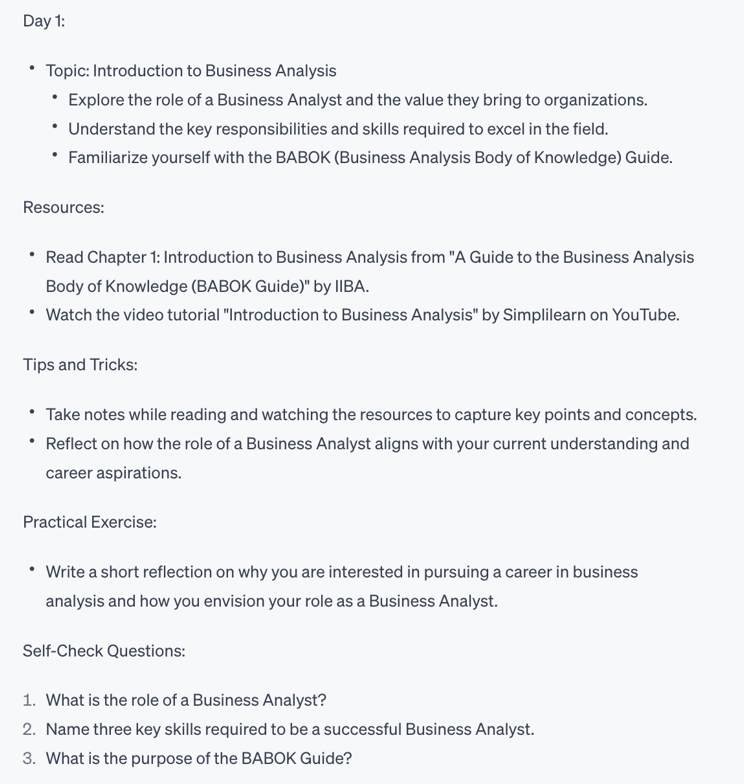ChatGPT as a mentor for a business analyst: a practical case
ChatGPT can be a mentor for self-development if tasks are properly established. This article provides a checklist for successful interaction with artificial intelligence, examples of queries and responses, and tips for creating a learning plan.
The author of this article is EPAM business analyst Kirill Pereshitov.

ChatGPT as a tool for self-learning and professional development
ChatGPT has been making headlines for almost half a year now. It is being used for a wide range of tasks, from meal planning to market analysis to copywriting. In this article, I share my experience of using this AI model for self-learning and suggest ways you can leverage the capacity of ChatGPT to enhance your professional skills.
First, a disclaimer: I work as a middle business analyst, and I am preparing for a senior-level assessment. Therefore, all query examples below were created in this context. This doesn’t mean that they are only suitable for business analysts. Instead, the flexibility of ChatGPT means that it can become a mentor in almost any area. All prompts (queries) below are in English, but they can be translated into any supported language.
How to create a proper query?
When creating a query in ChatGPT, I always use the following checklist to effectively interact with the model and receive the most accurate and relevant answers:
- Persona: I try to provide as much context as possible, and I specify the role that I want the neural network to take when processing my query. If I'm reaching out as a student, for example, I would indicate that I am a student to get answers tailored to educational needs.
- Task: I carefully identify my goal, indicate what I want to achieve, and I describe my commitments and expectations in detail. For instance, if I need to solve a certain programming problem, I will describe its characteristics, causes, and expected solutions.
- Constraints: I consider including limitations so that the model doesn't spend time on unnecessary details. I can, for example, clarify that I don't need excessive details or in-depth analytical research if a concise answer is enough. Additionally, I can specify certain scenarios or issues to avoid.
- Response format: I indicate the format in which I prefer to receive information. For example, I can request an answer in a particular style, with a specific tone or formatting, to facilitate further analysis. I can also specify a format for the information, such as lists, graphs, etc.
My first prompt looked like this:
- "Act as an experienced lead business analyst with extensive background in mentoring. You have deep BA theory knowledge and willing to help less experienced colleagues reach new career heights by teaching them. Your goal is to provide me (middle level business analyst with 2.5 years of experience) with learning materials that include theory, practical lessons, case studies and self-check questions. Contrains: Please follow my instructions carefully and fully execute them. Output: Please use Informative and friendly dialogue style, asking follow-up questions in order to provide most accurate and relevant information."
In response to that query, ChatGPT provided an approximate plan and questions.
How to get a ready-to-use learning plan
Now, let's ask for a learning plan with checkpoints and specific deadlines using the following query:
- "Please provide me with a learning plan for the following 2 month with important checkpoints. I want to study 2 hours a day excluding weekends."
And then, let's ask for a more detailed outline of the first week, to create an achievable plan:
- "Give me more detailed and worked out plan for the first week. It should include topics that will be explored, resources and references I need to go through, tips and tricks I should pay close attention to when studying and practical exercises along a list of self-check questions I should be able to answer by the end of this week."
ChatGPT provides the following response:

As you can see, the response is quite detailed and covers the key aspects closely. If you wish, you can request more detail on any of the topics and also ask for additional resources or tasks. You can also use ChatGPT to ask you questions and then provide feedback on how you answered those questions to ensure a complete immersion in your learning experience. The great thing is that ChatGPT can help improve knowledge in almost any field.
Conclusion
It is important to mention that all the prompts above are simply examples and not the only way to proceed. You are free to modify everything according to your convenience, and to formulate queries that are most suitable for your situation. The possibilities of AI are truly limitless. It is a convenient tool that can save time and simplify the search for relevant information, facilitating professional development. Remember, however, that your success always depends on you.
P.S. This article has been written with the help of ChatGPT.


.png)
